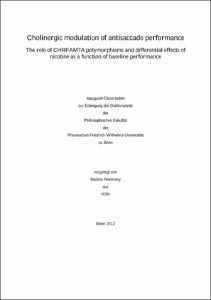Petrovsky, Nadine: Cholinergic modulation of antisaccade performance : The role of CHRFAM7A polymorphisms and differential effects of nicotine as a function of baseline performance. - Bonn, 2012. - Dissertation, Rheinische Friedrich-Wilhelms-Universität Bonn.
Online-Ausgabe in bonndoc: https://nbn-resolving.org/urn:nbn:de:hbz:5-28182
Online-Ausgabe in bonndoc: https://nbn-resolving.org/urn:nbn:de:hbz:5-28182
@phdthesis{handle:20.500.11811/5225,
urn: https://nbn-resolving.org/urn:nbn:de:hbz:5-28182,
author = {{Nadine Petrovsky}},
title = {Cholinergic modulation of antisaccade performance : The role of CHRFAM7A polymorphisms and differential effects of nicotine as a function of baseline performance},
school = {Rheinische Friedrich-Wilhelms-Universität Bonn},
year = 2012,
month = jun,
note = {Objectives. The cognitive domain that is most consistently improved by smoking and nicotine application is attentional performance. However, there are still a number of unanswered questions concerning the possible procognitive effects of nicotine and nicotine-like substances on executive functioning. Moreover, more insight is needed into what predicts the effectiveness of cholinergic treatment. Therefore, in the present investigations the antisaccade task, a paradigm of executive control, was chosen to examine cholinergic effects.
Methods. The aim of the first study, the genetic study, was to investigate whether genetic polymorphisms in the cholinergic system, the CHRFAM7A copy number and 2bp deletion polymorphisms, were associated with antisaccade performance. The second study, the nicotine study, tested the hypothesis that baseline performance level may be a behavioral predictor of the effects of nicotine on antisaccade performance.
Results. In the genetic study no significant associations were observed of 2-bp deletion or CHRFAM7A copy number with antisaccade performance. The nicotine study demonstrated that the administration of nicotine enhanced antisaccade performance in low-performing subjects, whereas it had no effect in high-performing subjects.
Conclusions. The failure to observe an association between antisaccade performance and polymorphisms in the CHRFAM7A gene in the genetic study provides evidence of the specificity of the effects of the CHRFAM7A gene on hippocampal and memory functions. The results from the nicotine study suggest that stimulation of the nicotinic acetylcholine receptor (nAChR) system might be an effective way of improving executive functioning in people with poor baseline performance, such as patients with dementia, ADHD, or schizophrenia.},
url = {https://hdl.handle.net/20.500.11811/5225}
}
urn: https://nbn-resolving.org/urn:nbn:de:hbz:5-28182,
author = {{Nadine Petrovsky}},
title = {Cholinergic modulation of antisaccade performance : The role of CHRFAM7A polymorphisms and differential effects of nicotine as a function of baseline performance},
school = {Rheinische Friedrich-Wilhelms-Universität Bonn},
year = 2012,
month = jun,
note = {Objectives. The cognitive domain that is most consistently improved by smoking and nicotine application is attentional performance. However, there are still a number of unanswered questions concerning the possible procognitive effects of nicotine and nicotine-like substances on executive functioning. Moreover, more insight is needed into what predicts the effectiveness of cholinergic treatment. Therefore, in the present investigations the antisaccade task, a paradigm of executive control, was chosen to examine cholinergic effects.
Methods. The aim of the first study, the genetic study, was to investigate whether genetic polymorphisms in the cholinergic system, the CHRFAM7A copy number and 2bp deletion polymorphisms, were associated with antisaccade performance. The second study, the nicotine study, tested the hypothesis that baseline performance level may be a behavioral predictor of the effects of nicotine on antisaccade performance.
Results. In the genetic study no significant associations were observed of 2-bp deletion or CHRFAM7A copy number with antisaccade performance. The nicotine study demonstrated that the administration of nicotine enhanced antisaccade performance in low-performing subjects, whereas it had no effect in high-performing subjects.
Conclusions. The failure to observe an association between antisaccade performance and polymorphisms in the CHRFAM7A gene in the genetic study provides evidence of the specificity of the effects of the CHRFAM7A gene on hippocampal and memory functions. The results from the nicotine study suggest that stimulation of the nicotinic acetylcholine receptor (nAChR) system might be an effective way of improving executive functioning in people with poor baseline performance, such as patients with dementia, ADHD, or schizophrenia.},
url = {https://hdl.handle.net/20.500.11811/5225}
}






